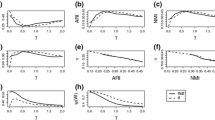Abstract
We analyze a corpus consisting of more than 17,000 abstracts in the general field of superconductivity, extracted from the arXiv – an online repository of scientific articles. We utilize a recently developed topic modeling method called SeNMFk, extending the standard Non-negative Matrix Factorization (NMF) methods by incorporating the semantic structure of the text, and adding a robust system for determining the number of topics. With SeNMFk, we were able to extract coherent topics validated by human experts. From these topics, a few are relatively general and cover broad concepts, while the majority can be precisely mapped to particular scientific effects or measurement techniques. The topics also differ by ubiquity, with only three topics prevalent in almost 40% of the abstract, while each specific topic tends to dominate a small subset of the abstracts. These results demonstrate the ability of SeNMFk to produce a layered and nuanced analysis of large scientific corpora.
Access this chapter
Tax calculation will be finalised at checkout
Purchases are for personal use only
Similar content being viewed by others
Notes
- 1.
- 2.
In 2018, the academic journal The Review of Higher Education had to suspend accepting submissions due to a two-year backlog.
- 3.
“Scientists are drowning in COVID-19 papers. Can new tools keep them afloat?”, J. Brainard, Science (2020).
- 4.
- 5.
The software is publicly available at https://github.com/lanl/pyDNMFk.
- 6.
All results are available at https://github.com/vstanev1/-NLP_arxiv_supercon.
References
Ailem, M., Salah, A., Nadif, M.: Non-negative matrix factorization meets word embedding. In: Proceedings of the 40th International ACM SIGIR Conference on Research and Development in Information Retrieval, pp. 1081–1084 (2017)
Bisgin, H., Liu, Z., Kelly, R., Fang, H., Xu, X., Tong, W.: Investigating drug repositioning opportunities in FDA drug labels through topic modeling. BMC Bioinf. 13(S15) (2012)
Blei, D.M., Ng, A.Y., Jordan, M.I.: Latent Dirichlet allocation. J. Mach. Learn. Res. 3, 993–1022 (2003)
Choo, J., Lee, C., Reddy, C.K., Park, H.: UTOPIAN: user-driven topic modeling based on interactive nonnegative matrix factorization. IEEE Trans. Visual Comput. Graphics 19(12), 1992–2001 (2013)
Deerwester, S., Dumais, S.T., Furnas, G.W., Landauer, T.K., Harshman, R.: Indexing by latent semantic analysis. J. Am. Soc. Inf. Sci. 41(6), 391–407 (1990)
Greene, D., Cross, J.P.: Unveiling the political agenda of the European parliament plenary: a topical analysis. In: WebSci 2015. ACM (2015)
Hirsch, J., Maple, M., Marsiglio, F.: Superconducting materials classes: introduction and overview. Physica C: Supercond. Appl. 514, 1–8 (2015). https://doi.org/10.1016/j.physc.2015.03.002. https://www.sciencedirect.com/science/article/pii/S0921453415000933
Hofmann, T.: Probabilistic latent semantic analysis. arXiv preprint arXiv:1301.6705 (2013)
Hong, L., Davison, B.D.: Empirical study of topic modeling in twitter. In: SOMA 2010. ACM (2010)
Kim, H., Choo, J., Kim, J., Reddy, C.K., Park, H.: Simultaneous discovery of common and discriminative topics via joint nonnegative matrix factorization. In: Proceedings of the 21th ACM SIGKDD International Conference on Knowledge Discovery and Data Mining, pp. 567–576 (2015)
Landhuis, E.: Scientific literature: information overload. Nature 535(7612), 457–458 (2016). https://doi.org/10.1038/nj7612-457a
Levy, O., Goldberg, Y.: Neural word embedding as implicit matrix factorization. In: Advances in Neural Information Processing Systems, pp. 2177–2185 (2014)
Mikolov, T., Sutskever, I., Chen, K., Corrado, G.S., Dean, J.: Distributed representations of words and phrases and their compositionality. In: Advances in Neural Information Processing Systems, pp. 3111–3119 (2013)
Gold in the text? Nature 483(7388), 124–124 (2012). https://doi.org/10.1038/483124a
Nguyen, T.H., Shirai, K.: Topic modeling based sentiment analysis on social media for stock market prediction. In: Proceedings of the 53rd Annual Meeting of the Association for Computational Linguistics and the 7th International Joint Conference on Natural Language Processing (Volume 1: Long Papers), pp. 1354–1364. ACL (2015)
Paatero, P., Tapper, U.: Positive matrix factorization: a non-negative factor model with optimal utilization of error estimates of data values. Environmetrics 5(2), 111–126 (1994)
Salah, A., Ailem, M., Nadif, M.: Word co-occurrence regularized non-negative matrix tri-factorization for text data co-clustering. In: Thirty-Second AAAI Conference on Artificial Intelligence (2018)
Shi, T., Kang, K., Choo, J., Reddy, C.K.: Short-text topic modeling via non-negative matrix factorization enriched with local word-context correlations. In: Proceedings of the 2018 World Wide Web Conference, pp. 1105–1114 (2018)
Vangara, R., et al.: Semantic nonnegative matrix factorization with automatic model determination for topic modeling. In: 2020 19th IEEE International Conference On Machine Learning And Applications (ICMLA). IEEE (2020)
Wang, C., Blei, D.M.: Collaborative topic modeling for recommending scientific articles. In: Proceedings of the 17th ACM SIGKDD International Conference on Knowledge Discovery and Data Mining. ACM (2011)
Xu, W., Liu, X., Gong, Y.: Document clustering based on non-negative matrix factorization. In: Proceedings of the 26th Annual International ACM SIGIR Conference on Research and Development in Informaion Retrieval, pp. 267–273 (2003)
Young, T., Hazarika, D., Poria, S., Cambria, E.: Recent trends in deep learning based natural language processing [Review Article]. IEEE Comput. Intell. Mag. 13(3), 55–75 (2018). https://doi.org/10.1109/MCI.2018.2840738
Acknowledgments
This research was funded by DOE National Nuclear Security Administration (NNSA) - Office of Defense Nuclear Nonproliferation R&D (NA-22), and supported by the LANL LDRD grant 20190020DR and DOE BES STTR DE-SC0021599.
Author information
Authors and Affiliations
Corresponding author
Editor information
Editors and Affiliations
Rights and permissions
Copyright information
© 2022 Springer Nature Switzerland AG
About this paper
Cite this paper
Stanev, V., Skau, E., Takeuchi, I., Alexandrov, B.S. (2022). Topic Analysis of Superconductivity Literature by Semantic Non-negative Matrix Factorization. In: Lirkov, I., Margenov, S. (eds) Large-Scale Scientific Computing. LSSC 2021. Lecture Notes in Computer Science, vol 13127. Springer, Cham. https://doi.org/10.1007/978-3-030-97549-4_41
Download citation
DOI: https://doi.org/10.1007/978-3-030-97549-4_41
Published:
Publisher Name: Springer, Cham
Print ISBN: 978-3-030-97548-7
Online ISBN: 978-3-030-97549-4
eBook Packages: Computer ScienceComputer Science (R0)




